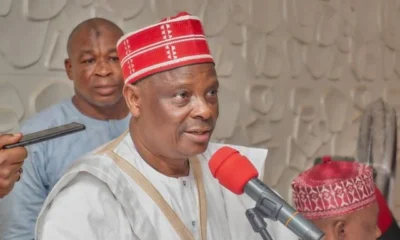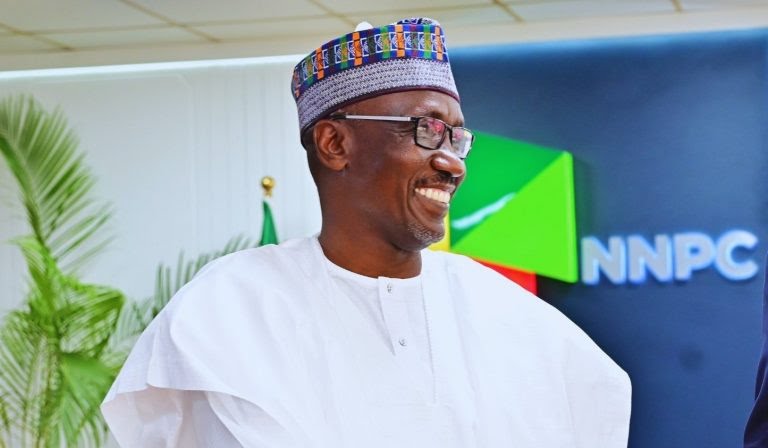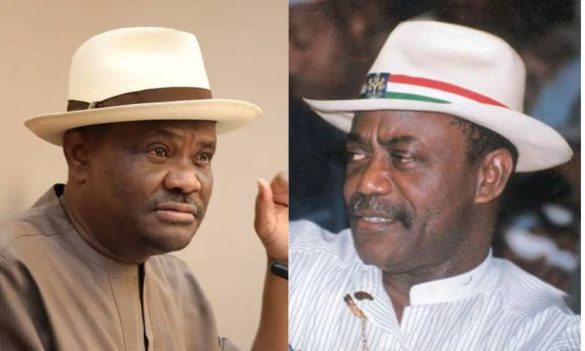The Nigerian National Petroleum Company Limited may begin the supply of crude oil in naira to the Dangote Petroleum Refinery this week following the announcement by the Federal Government that the naira-for-crude deal has commenced.
Also, following the promise by the government, three more refineries are getting set to start the production of Premium Motor Spirit, otherwise known as petrol, it was gathered on Sunday.
The three refineries include the 11,000 barrels per day capacity Aradel refinery in Rivers State; 20,000-capacity Clairgold refinery in Delta State; and 12,000-capacity Azikel in Bayelsa.
This came as officials at the $20bn Dangote refinery in Lagos and operators of other domestic refineries confirmed on Sunday that though the deal for crude supply in naira has commenced, the commodity is expected to hit the biggest refinery in Africa this week.
On Saturday the Federal Government said it had commenced the sales of crude oil and other refined products in naira.
The Federal Ministry of Finance disclosed this in a post on its X handle.
The statement read, “The Minister of Finance and Coordinating Minister of the Economy announced that, in line with the Federal Executive Council directive, the sale of crude oil and refined petroleum products in naira has officially commenced as of October 1, 2024.
“Following a meeting of the Implementation Committee, chaired by the Minister of Finance on October 3, 2024, to conduct a post-commencement review of the Crude Oil and Refined Products Sales in Naira initiative, the commencement of this strategic initiative was affirmed by key stakeholders.”
Reacting to this on Sunday, officials at the Dangote refinery commended the move by the government and expressed hope that the commodity would arrive the plant this week barring any unforeseen circumstances.
“The deal is still a work in progress and I’m sure that by this week the committee should be done with it,” an impeccable senior source at the plant who spoke to our correspondent in confidence due to lack of authorisation to speak on the matter, stated.
When probed further to confirm if the crude supplied in naira had arrived at the plant, the official insisted that the deal “is a work in progress, adding that “nobody will say crude has arrived anywhere now.”
The source continued, “As of Friday, discussions about it were still ongoing. But I’m sure there will be a complete picture by this week. However, the whole thing is okay. It is a good signal about the crude oil supply in naira.
“And I can assure you that once the first cargo delivers the crude, I’ll send you a picture of it so that you’ll confirm that the deal has been completed. It is also for record purposes. You should have documents and photographs to show the first supply for such deals, having dates and possibly time of arrival.”
Another source at the plant stated that the naira-for-crude deal would last for six months under the first phase.
“The deal is for six months in the first instance. People shouldn’t think it is forever. This is a dollar-based business, so supplying it in naira though at the equivalent dollar rate is significant. The President should be commended for this.
“Otherwise, the local crude would have been purchased from foreign-based traders who often mark up their prices and this has its effect on the cost of producing refined commodities whether in Nigeria or elsewhere,” the official stated.
Earlier, the Crude Oil Refinery Owners Association of Nigeria and the Petroleum Retail Outlet Owners Association of Nigeria welcomed the announcement of the government on the commencement of the naira-for-crude deal.
They, however, asked the government to provide details about the deal.
“The details of this agreement is not known yet but we hope that the intricacies will be revealed to the public because this business is the central value of everything that happen in our economy. PMS is key and the pricing of the crude is important as it determines the price of the commodity.
“It will be a great thing for us to know the details and its implementation. However, we are happy with the deal and congratulate everyone involved,” the President of PETROAN, Billy Gillis-Harry, had stated.
Last month, the Technical Sub-Committee on Domestic Sales of Crude Oil in Local Currency announced that the Federal Executive Council under the leadership of President Bola Tinubu had approved the sale of crude to local refineries in naira and the corresponding purchase of petroleum products in naira.
“From October 1, NNPC will commence the supply of about 385kbpd (385,000 barrels per day) of crude oil to the Dangote refinery to be paid for in naira,” the committee had declared.
The government explained in September that the naira-for-crude initiative would help reduce pressure on the naira, eliminate unnecessary transaction costs, and improve the availability of petroleum products across the country.
“Since then, the implementation committee chaired by the Minister of Finance and we, the technical committee, have worked intensely with NNPC and Dangote refinery to fashion out the details of the modalities for the implementation of the FEC approval,” the finance ministry had stated in a statement.
While stating that crude would be sold to Dangote in naira from October 1, it said, “In return, the Dangote refinery will supply PMS (petrol) and diesel of equivalent value to the domestic market to be paid in naira.
“Diesel will be sold in naira by the Dangote refinery to any interested off-taker. PMS will only be sold to NNPC. NNPC will then sell to various marketers for now. All associated regulatory costs (NPA, NIMASA, etc.) will also be paid in naira. We are also setting up a one-stop shop that will coordinate service provision from all regulatory agencies, security agencies, and other stakeholders to ensure a smooth implementation of this initiative.”
But in the finance ministry’s statement on Saturday, the government announced that the deal had commenced. It said this was after a meeting with critical stakeholders involved in the deal.
The statement added that officials at the meeting include the Minister of State, Petroleum (Oil), Heineken Lokpobiri, the Special Adviser to the President on Revenue, Zaccheus Adedeji, the Special Adviser to the President on Energy, Olu Verheijen, and the Chief Executive of the Nigerian Midstream and Downstream Petroleum Regulatory Authority, Farouk Ahmed.
Others include the representative of the Chairman of Dangote Group, the Vice President of Dangote Group, and the management of the Nigerian National Petroleum Company, led by the Group Chief Executive Officer, Mele Kyari, Chief Financial Officer, Umar Ajiya, and the NNPC Executive Vice President (Downstream), Adeyemi Adetunji.
Following the promise by the government on crude supply in naira, three modular refineries are getting set to start the production of petrol.
The three refineries will join the Dangote refinery to produce more petrol for local consumption, ending petrol importation in Nigeria.
According to The Punch, sources outlined the three refineries to include the 11,000 barrels per day capacity Aradel refinery in Rivers State, the 20,000-capacity Clairgold refinery in Delta State, and the 12,000-capacity Azikel in Bayelsa.
Owners of the three refineries are at various stages of work on their plants, it was gathered on Sunday.
Modular refineries have been producing diesel but are not producing petrol.
From 2015 to 2019, Nigeria could only produce 1.46 billion litres of petrol due to low refining capacity caused by the country’s inactive refineries, the National Bureau of Statistics stated.
According to The Punch, it was observed that the 1.46 billion litres produced within the period was not up to what the country would consume in two months.
From 2020 to 2023, the country only produced diesel and kerosene with the help of modular refineries, as the country’s refineries were moribund.
It was revealed that about 69.71 million litres of kerosene were locally produced in 2023, compared to 44.68 million litres in the previous year, indicating a 56.02 per cent rise.
For diesel, 109.39 million litres were locally produced in 2023, compared to 102.47 million litres reported in 2022, representing a 6.76 percent growth rate.
Curious about why the local refineries could not produce PMS, experts told our correspondent that each of these refineries would need to be upgraded with an investment of not less than $60m.
“Producing PMS would mean additional equipment – catalytic reformers – which costs about $60m. Most of the owners of these refineries don’t have the resources. The refineries need cash flow to make this additional investment,” an impeccable source stated.
It was gathered that Aradel has started the upgrade of its facility to accommodate the catalytic reformer while Azikel is also leaving no stone unturned.
According to another source, Clairgold refinery is using the isomerisation technology to process petrol production.
It was stated that the isomerisation technology can produce petrol at a cheaper rate than using the catalytic reformer. However, its use and compatibility depend on the configuration of the refinery.
It appears the refineries are eager to commence production of petrol following the decision of the government to sell crude to refineries in the local currency.
The modular refineries, which have suffered crude crisis over the years, felt they may not benefit from the naira-crude sale unless they venture into petrol production.
Aside from this, the seeming deregulation of PMS after the Dangote refinery began the sale of the product to the Nigerian National Petroleum Company Limited, could prompt many others to consider going into PMS production, believing there would be returns on investments when the government stops subsidies.

 BIG STORY4 days ago
BIG STORY4 days ago
 BIG STORY4 days ago
BIG STORY4 days ago
 BIG STORY3 days ago
BIG STORY3 days ago
 BIG STORY4 days ago
BIG STORY4 days ago
 BIG STORY4 days ago
BIG STORY4 days ago
 BIG STORY2 days ago
BIG STORY2 days ago
 BIG STORY4 days ago
BIG STORY4 days ago
 BIG STORY4 days ago
BIG STORY4 days ago
























